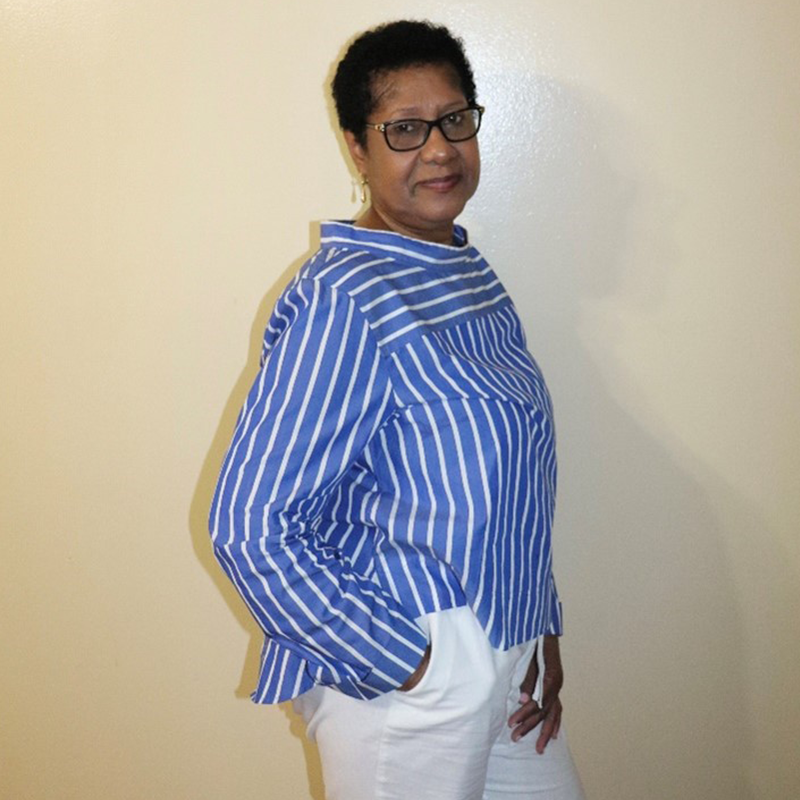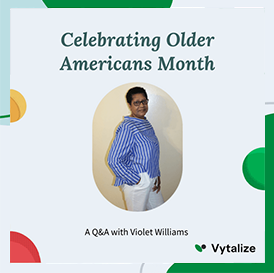 May is Older Americans Month, and this year’s theme is Aging Unbound! Led by the Administration for Community Living, this month recognizes the importance of combating stereotypes based on age and reinforcing the benefits we receive when older Americans are included and allowed to remain independent.
May is Older Americans Month, and this year’s theme is Aging Unbound! Led by the Administration for Community Living, this month recognizes the importance of combating stereotypes based on age and reinforcing the benefits we receive when older Americans are included and allowed to remain independent.
In celebration of Older Americans Month, we talked to recent retiree Violet Williams about aging, health and wellness, and her advice for younger Americans.
Check it out.
How has your perspective on what’s important changed as you’ve grown older?
I was born in Jamaica, West Indies. My family did not have much money so financial stability was something that I thought about often. It was always important that I gave my children the life I was not able to have. As I have gotten older, I have realized that health and wellness are also, if not more, important. My family has a history of high blood pressure and high cholesterol. My health and wellness suffered because my concern was always making sure I made it to work so I can provide for my family. I am learning to slow down and take care of myself.
You’ve recently retired. How has being in the workforce changed as you’ve gotten older?
I am 67 years old. I worked as a central sterile technician for 20 years at a hospital in New York City. Over the years, the workload in my department increased, and the size of the staff decreased. However, a positive change that came from that was the push for a better work environment. My generation typically stays put. For me, I did not have the educational background that would give many options. The younger generation that has been entering the workforce tends to speak up.
How has your role as a caregiver impacted your life?
I have been a caregiver for most of my life. First, for my children, and now, my husband. It has been difficult having to tend to his needs and health issues because I have to manage my own at the same time. During the last two years, I have had to miss work and use my days off to ensure my husband gets the care he needs. I never really thought about the impact of being a caregiver because, as the matriarch, it just seemed like my duty. Now as a retiree, I think about it often. I always imagined my husband and me healthy, splitting time between America and Jamaica. That is no longer an option.
What has retirement shown you about your health? Do you pay more attention to your health now?
I retired in March. Retirement has been eye-opening. I think I am paying more attention to my health because I have more time to. For years, I woke up at 4:00 AM to leave my house by 5:00 AM, getting home close to 7:00 PM. I did not have an office job so, Monday through Friday, I was on my feet for hours. As I got older, the job started to wear me down, and I often found myself too tired to even think about exercise when I returned home. Eating healthy was also hard because healthy food options are expensive. Instead of moving at work, I now take morning walks which make me feel energized and proud.
How has your relationship with your provider changed throughout the years?
My husband and I have shared the same doctor for over 13 years. When their office moves, we move with them. I feel comfortable with him and his staff but as my husband’s health has declined over the years, I have wondered what it would be like to see another doctor.
You aren’t currently with a physician participating in value-based care. How would the switch impact the care you receive?
I am not sure what the impact would mean for me. If my husband saw another doctor who had more time to give or more services to perform, I think we would be better off. He could finally receive the care that I struggle to give, which would alleviate some of the pressure I face. I think the decrease in stress could improve my health too.
What is one piece of advice you would give younger Americans?
The advice I would give younger Americans is focus on your education and your health early on. A good education gives you more options which can make getting older easier. Maintaining good health can also do the same. I often feel like I can’t do much because of my health, aches, and pains. Try to prepare for old age by taking care of yourself in the present.
Providers, are you interested in learning how value-based care can benefit your older adult patients and their caregivers? Contact us today!






